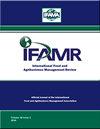Analysis of competitiveness and economic profit of the confectionary sector in Kazakhstan and its comparison with Czech Republic data
IF 1.5
4区 经济学
Q3 AGRICULTURAL ECONOMICS & POLICY
International Food and Agribusiness Management Review
Pub Date : 2021-12-16
DOI:10.22434/ifamr2020.0206
引用次数: 0
Abstract
Measuring competitiveness in post-communist countries in Central Asia is challenging. Many well-known metrics fail to warn bankruptcy risks sufficiently early or at all. This study uses metrics of the Altman z-score, Taffler z-score, IN99, IN01, IN05, and creditworthiness models to assess bankruptcy likelihood and financial performance of local and foreign confectionery companies operating in Kazakhstan during 2007-2018. These companies are Roshen, KDV Yaskino, Konti, Rakhat, and Bayan Sulu. The IN bankruptcy and creditworthiness models are considered in this study because they are found to be more appropriate for post-communist countries. Compared to the well known Altman or Taffler z-score models, they better suit the events and corporate situations peculiar to these countries. The benchmarking INFA system, involving a pyramidal approach developed for Czech companies, provides the economic-value-added (EVA) and component indicators to analyze competitiveness. This study also compares the performance of Kazakhstan companies with Nestlé Czechia and the Czech food industry. The objective is to analyze company competitiveness, bankruptcy probability, and ability to create value. Results show the effectiveness of INFA in analyzing competitiveness and the applicability of IN models to companies from Kazakhstan, Russia, Ukraine, and the Czech Republic.哈萨克斯坦糖果行业的竞争力和经济利润分析及其与捷克数据的比较
衡量中亚后共产主义国家的竞争力具有挑战性。许多众所周知的指标都未能足够早地或根本没有对破产风险发出警告。本研究使用Altman z-score、Taffler z-score、IN99、IN01、IN05和信誉模型的指标来评估2007-2018年在哈萨克斯坦经营的本地和外国糖果公司的破产可能性和财务绩效。这些公司是Roshen, KDV Yaskino, Konti, Rakhat和Bayan Sulu。在本研究中考虑了IN破产和信誉模型,因为发现它们更适合后共产主义国家。与众所周知的Altman或Taffler z-score模型相比,它们更适合这些国家特有的事件和企业情况。为捷克公司制定的基准法包括金字塔方法,提供经济增值和组成指标来分析竞争力。本研究还比较了哈萨克斯坦公司与雀巢捷克公司和捷克食品工业的绩效。目的是分析公司的竞争力、破产概率和创造价值的能力。结果表明,ina在分析竞争力方面的有效性,以及in模型对哈萨克斯坦、俄罗斯、乌克兰和捷克共和国公司的适用性。
本文章由计算机程序翻译,如有差异,请以英文原文为准。
求助全文
约1分钟内获得全文
求助全文
来源期刊

International Food and Agribusiness Management Review
AGRICULTURAL ECONOMICS & POLICY-
CiteScore
2.90
自引率
0.00%
发文量
0
审稿时长
>12 weeks
期刊介绍:
The IFAMR is an internationally recognized catalyst for discussion and inquiry on issues related to the global food and agribusiness system. The journal provides an intellectual meeting place for industry executives, managers, scholars and practitioners interested in the effective management of agribusiness firms and organizations.
IFAMR publishes high quality, peer reviewed, scholarly articles on topics related to the practice of management in the food and agribusiness industry. The Journal provides managers, researchers and teachers a forum where they can publish and acquire research results, new ideas, applications of new knowledge, and discussions of issues important to the worldwide food and agribusiness system. The Review is published electronically on this website.
The core values of the Review are as follows: excellent academic contributions; fast, thorough, and detailed peer reviews; building human capital through the development of good writing skills in scholars and students; broad international representation among authors, editors, and reviewers; a showcase for IFAMA’s unique industry-scholar relationship, and a facilitator of international debate, networking, and research in agribusiness.
The Review welcomes scholarly articles on business, public policy, law and education pertaining to the global food system. Articles may be applied or theoretical, but must relevant to managers or management scholars studies, industry interviews, and book reviews are also welcome.
 求助内容:
求助内容: 应助结果提醒方式:
应助结果提醒方式:


